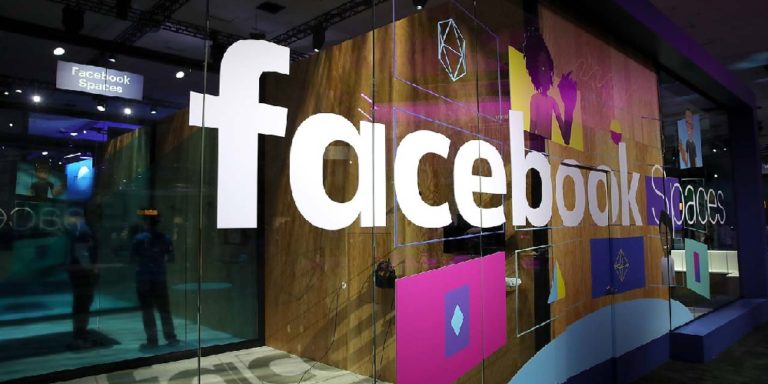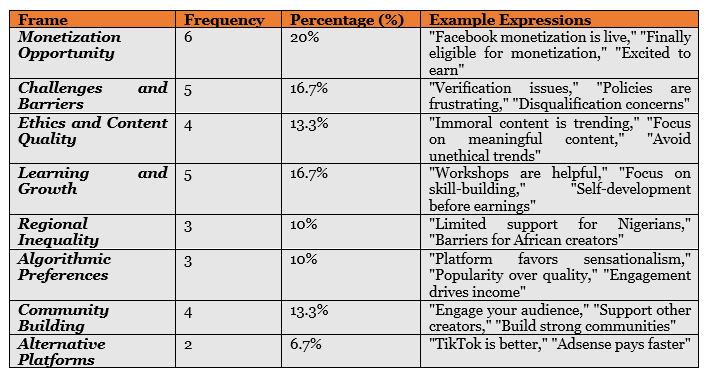
In the evolving digital economy, Facebook’s monetization features have become a significant talking point among content creators. As a social media platform with over two billion users, Facebook’s move to provide monetization tools presents opportunities and challenges for its global creator community. By examining the framing of Facebook monetization using 28 posts from Nigeria’s digital space, our analyst uncovered not only how creators perceive these tools but also the broader implications for regional inequality, ethics, and the sustainability of digital livelihoods.
Frames of Facebook Monetization
Content creators and other stakeholders frame Facebook monetization in distinct ways that reveal their diverse experiences. These frames, based on a recent analysis, include monetization opportunities, challenges and barriers, ethics and content quality, learning and growth, regional inequality, algorithmic preferences, community building, and alternative platforms. Understanding these frames is essential for assessing the promises and pitfalls of monetization in the digital ecosystem.
Monetization Opportunity: A Window to Financial Independence
The most dominant frame, monetization opportunity (20%), reflects the optimism of creators eager to capitalize on Facebook’s monetization features. Phrases like “Finally eligible for monetization” and “Excited to earn” underscore the aspirations of individuals who see content creation as a path to financial independence. For many creators, Facebook offers a platform to transform their passion into a sustainable career, with tools such as ad revenue sharing, subscription models, and fan support. This framing aligns with global trends in the creator economy, where platforms like YouTube, TikTok, and Facebook compete to attract and retain content creators by offering financial incentives. However, the accessibility and long-term viability of these opportunities remain critical areas of concern.
Register for Tekedia Mini-MBA edition 19 (Feb 9 – May 2, 2026).
Register for Tekedia AI in Business Masterclass.
Join Tekedia Capital Syndicate and co-invest in great global startups.
Register for Tekedia AI Lab.
Challenges and Barriers: A Road Paved with Frustrations
While the prospect of monetization is enticing, challenges and barriers (16.7%) emerge as a prominent frame. Many creators face verification issues, disqualification due to policy complexities, and technical hurdles in setting up monetization. “Policies are frustrating” and “Verification issues” encapsulate the frustrations of creators, particularly those from regions with limited support systems. This frame highlights the need for Facebook to streamline its policies and provide transparent communication. For creators, the challenge lies in navigating these obstacles while maintaining their focus on content production and audience engagement.
Ethics and Content Quality: Balancing Profit with Purpose
The ethical dimension of Facebook monetization is reflected in the frame of ethics and content quality (13.3%). Creators critique the rise of “immoral content” that prioritizes sensationalism over substance. Many argue that the pursuit of engagement metrics often drives creators to compromise on ethical standards. This concern resonates with broader debates about the responsibilities of digital platforms. As arbiters of content, platforms like Facebook must strike a balance between fostering creative freedom and curbing the spread of harmful or low-quality content.
Exhibit 1: Frames in Facebook Monetization Narratives

Regional Inequality: The Global Divide
The regional inequality frame (10%) sheds light on disparities in access to monetization tools. Creators from developing regions, particularly Africa, often lament the lack of support and opportunities compared to their counterparts in North America or Europe. Statements like “Limited support for Nigerians” highlight the systemic barriers faced by creators in underrepresented regions. Facebook’s monetization policies must address these disparities to ensure inclusivity. Providing localized support, simplifying verification processes, and fostering community engagement in underserved regions could help bridge the gap.
Algorithmic Preferences and Alternative Platforms
Two additional frames, algorithmic preferences (10%) and alternative platforms (6.7%), reflect creators’ frustrations with platform dynamics. The algorithmic preferences frame critiques Facebook’s tendency to favour sensational content, creating challenges for creators focused on quality or niche topics. Meanwhile, alternative platforms like TikTok and YouTube are often seen as better options for monetization, given their user-friendly interfaces and faster payout systems.
The Broader Implications
The framing of Facebook monetization offers valuable insights into the evolving creator economy. While the platform provides significant opportunities for financial independence, it also presents challenges that hinder inclusivity and equity. Ethical concerns, regional disparities, and algorithmic biases highlight the complex interplay between creators and platforms. For Facebook, addressing these issues is not just about improving user experience but also about sustaining its position as a competitive player in the creator economy. Transparency in policies, equitable access, and a focus on ethical content production is crucial for fostering trust and loyalty among creators.
For creators, the framing of monetization indicates the importance of adaptability. Navigating platform dynamics, building authentic communities, and maintaining ethical standards are essential for long-term success. Additionally, exploring alternative platforms and diversifying income streams can help mitigate the risks associated with platform dependency.



